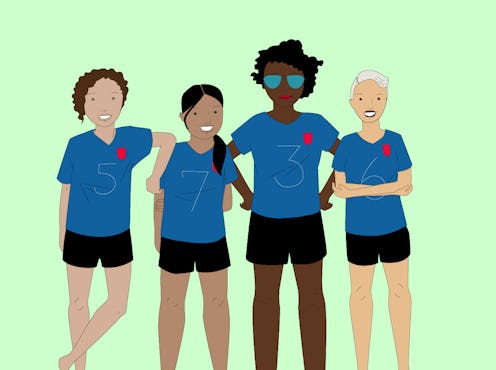
One of the easiest and most impactful ways we can practice feminism is to support people of all genders in our own relationships — and fortunately, it doesn't require too much effort to do that. There are a lot of little ways we can make our friendships more feminist. And by helping our friends overcome oppression and empower themselves, we ourselves also benefit — which, in turn, can help make all the bigger changes our culture at large still needs. It's all connected, and it all matters.
Unfortunately, patriarchy pits women against one another. As Chimamanda Ngozi Adichie pointed out in the TED Talk "We Should All Be Feminists," "We raise girls to see each other as competitors, not for jobs or accomplishments, which I think can be a good thing, but for the attention of men." So, just by being friends, we're already combatting one sexist convention. In addition, friendships also give us a way to commiserate when the rest of the world isn't on our side and remind one another that we're more than patriarchal society makes us out to be.
Feminist friendships aren't just for women, though. Friendships can also be a valuable way for men and other members of privileged groups to understand oppression and free one another from gender roles.
Here are a few little ways you can encourage feminism in your friendships every day.
Push Your Friends To Aim High At Work
Too often, women undermine themselves at work due to stereotypes that they're less competent than men. So, one way to empower your friends is to ask them about their career goals, encourage them to achieve them, and push back if they say they don't think it's possible.
Give Your Friends Compliments Unrelated To Their Looks
It's OK to compliment your friends' looks or clothes, but women get comments on their looks a lot, and sometimes, reminding people that they are so much more than just their appearance can make a big difference. Tell your friends you admire their intelligence, strength, and other qualities beyond their beauty.
Support Your Friends' Sexual Decisions
Prude-shaming and slut-shaming both undermine women's relationships and impose unfair judgment upon women for choices that are theirs and theirs alone. No matter what choices your friends make, praise them for being true to themselves, and only question them if they've been pressured by others.
Validate Your Friends' Emotions
Gaslighting — making people doubt their own perceptions, emotions, and experiences — is a tactic commonly used against women, especially when they try to speak out about sexism. So, it's refreshing to have a listening ear when you need to sound off about experiencing mansplaining at work, being sexually harassed, and other microaggressions women face.
Educate Others, But Don't Rely On Others To Educate You
If you are privileged in any way — not just including gender but also including race, class, and other intersecting identities — do not use friends who are members of marginalized groups as free educational resources on oppression. But become a resource to other privileged friends. For example, if you're a white man, challenge your other white male friends to think about how women and people of color might experience the world, and read up on these issues so that you're sensitive around your less privileged friends. And when they do offer their perspective on social justice issues, thank them for teaching you. Remember, it's not their job.
Images: Allison Gore/Bustle; Giphy (5)